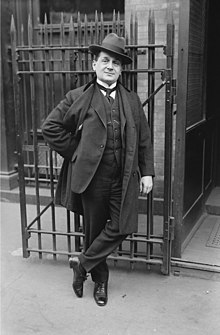Albert Reiss
Albert Reiss , also Albert Reiss , (born February 22, 1870 in Berlin , † June 19, 1940 in Nice ) was a German theater actor and opera singer ( tenor ).
Life
Reiss should first become a lawyer, but his urge to the stage was stronger. When his parents finally agreed, he received his training from Otto Ball , Otto Purschian and Ludwig Stahl . Afterwards he was engaged as a young lover in Rostock, Berlin (Berlin and Residenztheater), Königsberg, Strasbourg, Breslau and Hamburg. "Don Carlos", "Franz" in Götz , "Mortimer", "Kosinsky", "Romeo", "Masham" were his most popular roles.
In Hamburg, with the support of the impresario and theater entrepreneur Bernhard Pollini and the contralto Ernestine Schumann-Heink , he decided to embark on an operatic career. He studied singing with Wilhelm Vilmar , Julius Lieban and Benno Stolzenberg and made his debut in Königsberg in 1897 as "Peter Iwanow" in the opera Zar und Zimmermann by Albert Lortzing .
The following year he moved to the Poznan Opera House for one season , where he sang various roles. Between 1899 and autumn 1901 he appeared in various roles at the Wiesbaden Opera , before accepting an engagement at the Metropolitan Opera (Met), where he was the first tenor buffo until 1919 . He completed his debut at the Met in the role of "shepherd" in Tristan und Isolde by Richard Wagner and worked from 1910 to 1918 in some world premieres at this opera house. In 1910 he was the first tenor, with the approval of the composer Engelbert Humperdinck, to sing the part of "Knusperhexe", written for a mezzo-soprano , in his opera Hansel and Gretel at the Met.
In 1902 his wedding to the actress Käthe Brandt was planned, but she died before the wedding.
Between 1902 and 1907, guest performances took him to the Wagner Festival at the Munich Court Opera , 1902 to 1905 to the Covent Garden Opera in London , 1904 to the Stadttheater Hamburg , 1910 to the Paris Opera and 1911 to 1912 to the Chicago Opera .
When the First World War broke out , Reiss was in Nice, was interned there by the French authorities and was only able to return to New York after the intervention of the director of the Met Giulio Gatti-Casazza . In contrast to the other singers of German and Austrian nationality, he was able to pursue his activities at the Met.
In 1916 he sang in the Mozart operas Bastien and Bastienne and at the American premiere of The Drama Director at the Empire Theater in New York. By 1919 he had sung 54 parts in 736 performances at the Met.
In 1919 Reiss returned to Germany and was engaged at the Berlin Volksoper from 1923 to 1925 and at the Städtische Oper Berlin from 1925 to 1930 . From 1924 to 1928 he was again a guest at the Covent Garden Opera.
Reiss was not only an excellent opera singer, he could also convince as an operetta singer ("Eisenstein" in der Fledermaus , "Benozo" in Gasparone etc.)
In 1930 he finally ended his career and retired to his villa in Nice, where he died ten years later.
Repertoire (selection)
- Wenceslas in The Bartered Bride by Bedřich Smetana
- David in The Mastersingers of Nuremberg by Richard Wagner
- Mime in Das Rheingold and Siegfried by Richard Wagner
World premieres at the Met
- December 10, 1910: La fanciulla del West by Giacomo Puccini (part of Nick)
- December 28, 1910: King's children by Engelbert Humperdinck (role of the broom-maker)
- March 14, 1912: Mona by Horatio Parker
- February 27, 1913: Cyrano by Walter Damrosch
- March 8, 1917: The Canterbury Pilgrims by Reginald de Koven
- December 14, 1918: Il tabarro by Giacomo Puccini
literature
- Ludwig Eisenberg : Large biographical lexicon of the German stage in the XIX. Century . Verlag von Paul List , Leipzig 1903, p. 817, ( Textarchiv - Internet Archive ).
Web links
- Albert Reiss in the Bavarian Musicians' Lexicon Online (BMLO)
- Albert Reiss at Operissimo on the basis of the Great Singer Lexicon
Individual evidence
- ^ Käthe Brandt death report in The New York Dramatic Mirror of January 18, 1902, accessed on December 22, 2014
| personal data | |
|---|---|
| SURNAME | Tear, Albert |
| ALTERNATIVE NAMES | Reiss, Albert |
| BRIEF DESCRIPTION | German opera singer with a tenor voice |
| DATE OF BIRTH | February 22, 1870 |
| PLACE OF BIRTH | Berlin |
| DATE OF DEATH | June 19, 1940 |
| Place of death | Nice |
